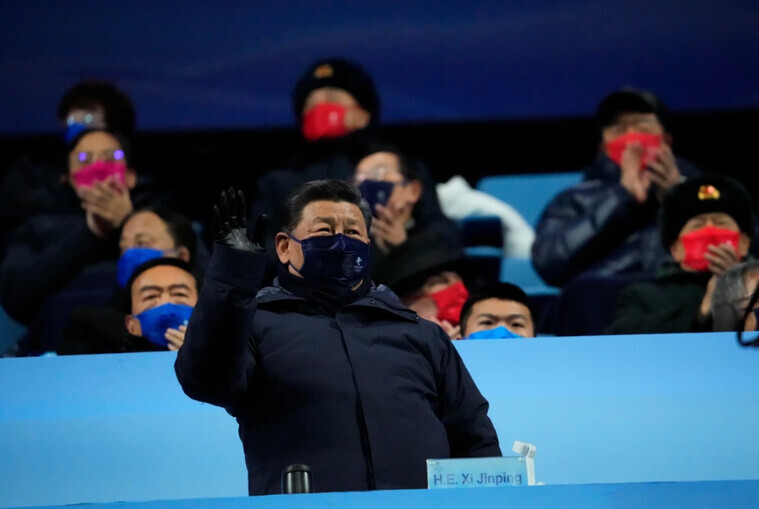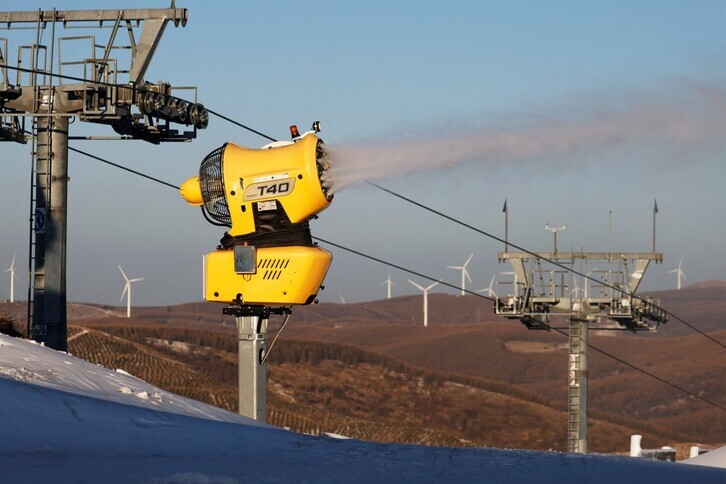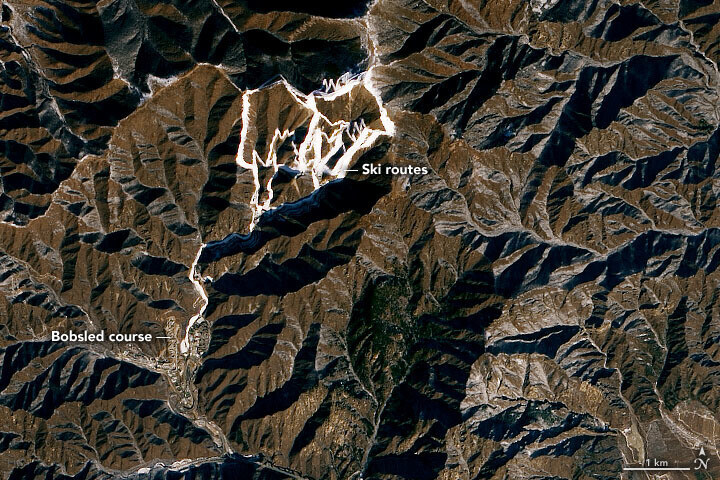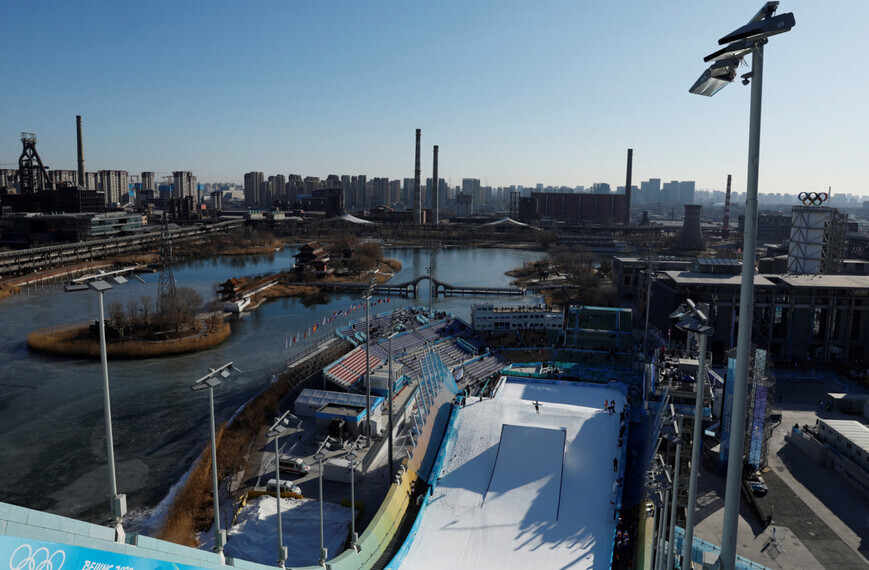hankyoreh
Links to other country sites 다른 나라 사이트 링크
How Beijing became the first city to host both Winter and Summer Olympics

With the latest Winter Olympics, Beijing became the first city in the world to host both the Summer and Winter Olympics.
Many countries have hosted both Olympics, including South Korea (Seoul and Pyeongchang), the US (Los Angeles, Salt Lake City, and numerous other cities), Japan (including Tokyo and Sapporo), Russia (Moscow and Sochi), Canada (including Montreal and Calgary), and France (including Paris and Albertville). But only one city in Olympic history has hosted both, and that’s Beijing.
As was the case with Japan and South Korea, the Olympics have sometimes helped to elevate the overall level of the host country in societal, economic, cultural and diplomatic terms. Indeed, the 2008 Summer Olympics in Beijing has been cited as one of the events where this effect was most pronounced.

After this dramatic effect from the Summer Games, it was expected that China would bid for the Winter Games. It started out with a bid from Harbin, a “snow city” celebrated in China for its ice lantern festival.
Harbin’s bid to host the Winter Olympics began in 2009, shortly after Beijing had hosted the Summer Games. But it kept being brushed aside by the Chinese government due to so little time having passed since China hosted the Summer Olympics.
Harbin is close to the Yabuli Ski Resort — Asia’s largest — and is equipped with various winter sport facilities. Working against it is the fact that it gets too cold for competition, with winter temperatures dripping down to 30 below. Another problem is its far northeastern location, which places it 1,000 kilometers from Beijing and 2,000 kilometers from Shanghai.
Around 2013, Beijing emerged as a Chinese contender for the Winter Olympics. It had already hosted the Summer Games, and it has a ski resort located in its hinterlands, about 160 kilometers away in the city of Zhangjiakou, Hebei Province.
This was also a time when people were stressing the importance of keeping the Olympics thriftier, after the Japanese city of Nagano (1998) and the Canadian city of Vancouver (2010) had registered huge losses hosting the Winter Games.
All the other major Chinese cities with the economic wherewithal to hold the Olympics — places like Shanghai, Guangzhou or Shenzhen — are located in the southeast, where temperatures typically remain above freezing even in the winter. The deep northwest suffers from its inaccessibility.
China proposed a plan to hold the ice events like short track speed skating in Beijing; Alpine skiing, bobsledding, and other sledding events in Yanqing on Beijing’s outskirts; and cross-country skiing events in Zhangjiakou. This would also help to save money since they could reuse the media center and other facilities from the previous Summer Games in Beijing.

Even with these preparations, China did not stand a strong chance of hosting the 2022 Winter Games, owing to the rule of alternating among contents. With the Pyeongchang Olympics in 2018 and Tokyo Olympics in 2020, it would mean three straight events taking place in Asia.
In July 2015, something rare happened just before the selection of the 2022 Winter Olympics host city by the International Olympic Committee (IOC). One by one, the strongest European candidates dropped their bids, citing internal factors and other reasons — leaving Beijing and Almaty as the only candidates.
Originally, four European cities had been up for the Games. But Oslo and Stockholm bowed out due to the costs. The Polish city of Krakow was a candidate, but voters rejected the plan to host the Olympics in a referendum.
Beijing still had a number of strikes against it, what with the streak of Asian countries hosting the Olympics, its authoritarian political regime, and its severe air pollution. But up against Almaty — a city in Kazakhstan, which also has a politically authoritarian regime — it managed to pull through by a slim margin of 44 votes to 40.

One problem remained to be solved. The skiing events were supposed to be held in Zhangjiakou and Yanqing, but those places tended to have very low snowfall in the winter.
The Chinese government decided to create a ski slope effectively relying 100% on artificial snow, which it built at an enormous cost. Some voiced concerns that making the snow would cause a water shortage and lead to environmental destruction, but these cries were disregarded.
The fact that artificial snow has become an inescapable part of winter sports also played a part — over 90% of the events in Pyeongchang had also taken place on the surface.
China built an artificial snow ski slope in Zhangjiakou by bringing water in from various locations along the mountain range — including a reservoir 100 kilometers away — and operating some 400 snow-making machines. In effect, it had created a massive resort in between Beijing and the Gobi Desert of Mongolia.
According to some estimates, the artificial snow for these Olympics will require around two million cubic meters of water. That’s the same amount that around 100 million people drink in a day.
In 2015, Britain’s The Times predicted that China would spend some US$90 million making artificial snow.
Olympics as a factor in Xi Jinping’s third presidential termWith the Olympics having established themselves as a more political event than any other, what does China have to gain from hosting them?
At the time Beijing was selected in 2015 to host the Winter Games, the Chinese government claimed the event would boost the population practicing winter sports by some 300 million.
The environmental beautification element is also laudable. President Xi Jinping pledged to turn the Winter Olympics into an occasion for remedying China’s notorious air pollution issues, and this has indeed been achieved to some extent — albeit with some help from the COVID-19 pandemic and forced factory shutdowns.
More than anything, it means considerable political gains at home for Xi.
Xi has served two terms as leader, marking his 10th year in office in 2022. According to precedent, he is supposed to step down and allow for the election of a new leader. The Winter Olympics had the potential to be a suitable setting for his retirement ceremony.
There was no way of knowing in 2015 whether Xi had designs on a third term. But a successful job hosting the Winter Olympics — in a situation where he is already favored to win a third term in the second half of this year — could be used as a reason for keeping him as general secretary of the party.
As vice president in 2008, Xi was responsible for overseeing preparations for the Summer Games in Beijing. At the time, he was rated as being relatively successful in that role — and it ended up working in his favor when he was selected to be China’s next leader.
By Choi Hyun-june, staff reporter
Please direct questions or comments to [english@hani.co.kr]

Editorial・opinion
![[Editorial] Intensifying US-China rivalry means Seoul must address uncertainty with Beijing sooner than later [Editorial] Intensifying US-China rivalry means Seoul must address uncertainty with Beijing sooner than later](https://flexible.img.hani.co.kr/flexible/normal/500/300/imgdb/original/2024/0517/8117159322045222.jpg) [Editorial] Intensifying US-China rivalry means Seoul must address uncertainty with Beijing sooner than later
[Editorial] Intensifying US-China rivalry means Seoul must address uncertainty with Beijing sooner than later![[Column] When ‘fairness’ means hate and violence [Column] When ‘fairness’ means hate and violence](https://flexible.img.hani.co.kr/flexible/normal/500/300/imgdb/original/2024/0516/7417158465908824.jpg) [Column] When ‘fairness’ means hate and violence
[Column] When ‘fairness’ means hate and violence- [Editorial] Yoon must stop abusing authority to shield himself from investigation
- [Column] US troop withdrawal from Korea could be the Acheson Line all over
- [Column] How to win back readers who’ve turned to YouTube for news
- [Column] Welcome to the president’s pity party
- [Editorial] Korea must respond firmly to Japan’s attempt to usurp Line
- [Editorial] Transfers of prosecutors investigating Korea’s first lady send chilling message
- [Column] Will Seoul’s ties with Moscow really recover on their own?
- [Column] Samsung’s ‘lost decade’ and Lee Jae-yong’s mismatched chopsticks
Most viewed articles
- 1For new generation of Chinese artists, discontent is disobedience
- 2[Column] US troop withdrawal from Korea could be the Acheson Line all over
- 3[Editorial] Transfers of prosecutors investigating Korea’s first lady send chilling message
- 4[Exclusive] Unearthed memo suggests Gwangju Uprising missing may have been cremated
- 5[Editorial] Intensifying US-China rivalry means Seoul must address uncertainty with Beijing sooner t
- 6Xi, Putin ‘oppose acts of military intimidation’ against N. Korea by US in joint statement
- 7China calls US tariffs ‘madness,’ warns of full-on trade conflict
- 8Could Korea’s Naver lose control of Line to Japan?
- 9China, Russia put foot down on US moves in Asia, ratchet up solidarity with N. Korea
- 10For Korea’s Justice Ministry, no place is sacred from immigration raids